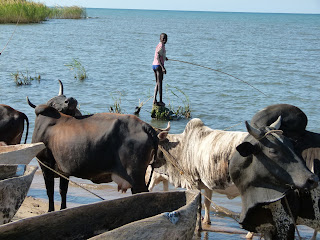Country folks have more actual contact, lots of trees, farms, cows and such. Lakes for fishing, mountains to climb, wildlife to see. However, there's an element of control here, you can participate or observe depending on just how much nature you can handle at any given moment. You go to it, and leave it when you've had your fill.
 |
Beach cows in Malawi.
|
 |
| Street cow in Malawi |
Crocs are sneaky, lying in wait for dogs, monkeys or the odd unfortunate villager cooling off in the river or washing clothes. Personally I would transport the water to higher ground. For some reason they don't eat the head. My friend from Kyela told me this, and as she had no idea why, I promised to google it. Some conversations you will only have in Africa.
 |
| Taking
a break from whatever it is dogs do, secure in the knowledge that he can sleep there all day if he wants to. |
The chickens, however, have forced me into an offensive mode. We feed the kids breakfast and lunch, sitting in the courtyard between the two classrooms. Kids being kids, there's usually bits of ugali and beans on the ground after meals. In the past a chicken or two would come to school and peck at the leftovers on the plates and in the dirt. Well now we have 63 kids, which has made the pickins more lavish. The chickens have told all their friends and now we have an entire army of free range fowl running around the school. The first time a chicken came into our Math class I just laughed and let the kids chase it around for a bit till Mbuli caught it and escorted it to the yard.
 |
| Recon chicken checking it out for the troops |
We were discussing local transport one day and my student asked if the buses in America are like the buses in Tz. I said that in the US we don't have five people in a seat made for two, and there's no chickens and goats allowed inside the bus. They were shocked and wanted to know how we transport our chickens and goats. Yet another conversation you won't have in the US.
 |
| And
as always, the road wanyama. If there's only one or two, you can muscle them out of the way, but a herd takes their time. Safety in numbers and all that. |
L
No comments:
Post a Comment